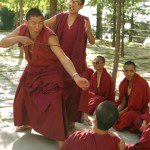A Tibetan Women’s Soccer team based in India has been denied visas to the United States, raising concerns about our country’s level of support for Tibetans and others under contested Chinese rule.
Cassie Childers, a coach for the team, said that they were told at the U.S. Embassy in New Delhi that they “have no good reason to visit the U.S.” The team had been invited to play in Dallas and until recently, the travel would have been business as usual for all involved in international sports. Childers, an American, is also the person who helped create the team. As Sanchari Pal wrote last fall:
For the young refugee women of the Tibetan Women’s Soccer team (soccer is another name for football), also known as the Snow Lionesses, the sport is more than just a recreational activity. It is a way for them to fight for gender equality, and use the sport as a tool to represent their homeland.
All but two of those planning to visit America hold Indian ID Certificates, issued to Tibetan refugees in the country – those who have fled Chinese-controlled Tibet.
The State Department has refused to discuss the details of the case, and said that the U.S. position regarding Tibet has not changed under the new administration, stating that Tibet is still considered to be part of China. Donald Trump has famously waffled recently on the case of China’s asserted control over Taiwan, an issue closely monitored by those who wish for a Free Tibet. As Jane Perlez of the NYTimes observes:
Mr. Trump’s reversal on Taiwan is likely to reinforce the views of those in China who see him as merely the latest American president to come into office talking tough on China, only to bend eventually to economic reality and adopt more cooperative policies. That could mean more difficult negotiations with Beijing on trade, North Korea and other issues.
At the same time, the Chinese leadership will view statements by Mr. Trump with even greater skepticism. “Even though Trump has said he will support the ‘One China’ policy, China cannot fully trust him,” said Yan Xuetong, dean of the school of international relations at Tsinghua University, in Beijing. “Even his own people don’t trust him.”
In recent Tibet-Trump news, we saw last year that “Tibetans for Trump” made some headlines:
As odd as it may seem for card carrying liberals and others who are simply confused by the popularity of Donald Trump, there are at least a couple historical reasons why Tibetans would prefer the brash Republican in the White House.
The normalization of trade relations with China and the effective de-linking of human rights and trade with the renewal of Most Favored Nation (MFN) trade status in 2000 under the Clinton administration was a significant blow to the human rights lobby and Tibetan Americans who seek to hold China accountable for continued rights violations in Tibet.
And:
That’s why, when then-President Bush awarded Tibet’s Nobel Prize-winning spiritual leader, His Holiness the Dalai Lama, the Congressional Gold Medal in 2007, Tibetan Americans considered the act a significant victory, evident by the marking of this event every year across the diaspora in gratitude to the Bush administration.
Meanwhile, “despite President Obama warmly welcoming the Dalai Lama at a National Prayer Breakfast last February, the meeting did nothing to change US-China policy, leading one writer to (quite convincingly) state that “Obama’s Meeting With The Dalai Lama Is An Empty Gesture.” So, over the last 25 years, the only US President to offer a ‘victory’ to Tibetans was George W. Bush.”
Tibetans are not the only ones who saw promise in Trump with regard to China. Many people hoping for a shift in U.S.-Taiwan relations chose to support then-candidate Trump, as well as some who thought that his antagonism toward China would lead to stronger U.S.-India ties. So far, those hopes have not panned out, while the spike in white nationalist hate crimes against minorities has led many to question their support for the current president.
One example, covered here, happened November 9th, the day after the election:
Tenzin Dorjee … is a practicing Buddhist, for whom “being peaceful is a huge part of his religion and identity.”
As an immigrant in America, he has faced racism and discrimination, but nothing like what happened to him last week.
On November 9th, the day after Donald Trump’s election, he was accosted outside his local Walmart by two men in camouflage jackets. One came up to him and said, “Hey chink, get the f— out of my country. Go back to where you came from.”
“Then it happened again,” he says. And then again. [read more here]
The denial of their opportunity to visit America could be a strong blow to the growth of Women’s Soccer among the Tibetan refugee community. However, it can also be an opportunity to learn more and support Tibet Women’s Soccer. See their appeal for reconsideration below (you can also contribute via “generosity” here).
https://www.youtube.com/watch?time_continue=45&v=fK98FgVmrk8












